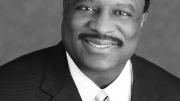James “J.B.” Brown ’73 has been a sportscaster for more than 20 years, covering football for Fox and football and basketball for CBS—for many sports fans, this would be the job of a lifetime. But Brown didn’t achieve professional success without encountering adversity along the way. After graduating from Harvard with a degree in government and four years of varsity basketball under his belt, Brown was drafted by the NBA’s Atlanta Hawks, only to be cut from the team during summer camp. Following this initial disappointment, he rebounded with a sales job at Xerox that led to a position in senior management. After five years there, Brown started covering the Washington Bullets (now the Washington Wizards) part-time; eventually, after using several months of vacation time to travel with the Bullets, he chose to leave Xerox to launch a full-time sportscasting career.
In his recently published part-memoir, part-self-help book, Role of a Lifetime: Reflections on Faith, Family, and Significant Living (Hachette),Brown explores how he found his “role in life” and advises readers on how to discover their own. “Having come from an environment where I was taught to game-plan, to map out short-term and long-term strategies,” he explains now, “I learned that important to this process is inspecting and reviewing what you have been doing and determining whether it has been successful.”
In examining his own life, Brown identified four areas that have helped him succeed personally and professionally. The first is recognizing your gift and perfecting it: for him, the key is picking a field you are passionate about and willing to work for. His high-school basketball coach, for example, had emphasized the importance of off-season training as the key to winning games, but Brown says he lost that discipline at Harvard—which was one of the main reasons he didn’t succeed in the NBA. In his sportscasting career, though, he took diction classes that helped lead to a promotion. Second, he believes that being a team-oriented player affords genuine success, despite the emphasis on the individual and the promotion of success based on “I” often perpetuated by the media. He cites Boston Celtics coach Red Auerbach, whom he knew, as an inspirational example of this tenet. Auerbach always told his players to “check your ego at the door” and “use your talent for the good of the team,” because he knew that even when players’ contributions don’t go into the record books, they can still be valuable to the team.
Third, Brown says he learned how important it is to bounce back from, not wallow in, mistakes—knowledge that helped him when he was cut from the Hawks, when he wore a flamboyant suit to an interview at conservative IBM, and when he announced during one of his early sportscasts that a football player had been tackled on the 60-yard line. Finally, he sees a need to recognize that there is an ultimate truth. His mother and sister rediscovered Christianity as adults and sparked a desire in Brown to dedicate his life to God first, family second, and career third in order to reach his fullest potential in the role he is meant to play.
Brown hopes his book lets readers find encouragement, inspiration, or wisdom in the anecdotes from his own journey. “I wanted to be very transparent, very open, and talk not just about the good things, but about the warts as well,” he explains. “I just wanted to share and let people make their own minds up.” In the book, he writes, “I suspect your journey has been a lot like mine. I haven’t always gotten it right, but if sharing from some of the times when I’ve gotten it wrong will help you, I will be humbled by that experience.”








